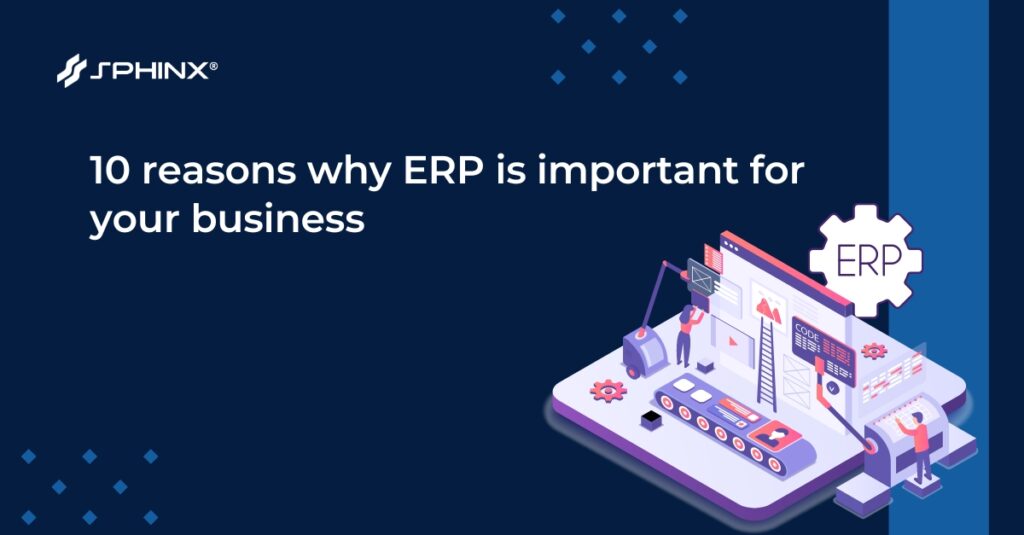Lately, an increasing number of enterprises have shown interest in implementing ERP systems in business management. So, what is ERP? Why does the ERP system attract such special attention?
Let’s join Sphinx in exploring the ERP management system and its outstanding strengths, as well as the reasons why ERP is so important to many businesses.
1. What is ERP and how does it work?
It’s no coincidence that ERP is increasingly receiving attention from businesses worldwide. Below will help you understand what ERP is and how it works:
1.1. What is ERP?
Enterprise Resource Planning (ERP) is a comprehensive software solution designed to assist small businesses in managing all aspects of their operations, from finance and human resources to manufacturing, supply chain, services, and procurement. This system streamlines and automates processes to enhance efficiency across the board.
1.2. How does it work?
An ERP (Enterprise Resource Planning) system, often referred to as an ERP suite, consists of interconnected modules or business apps that share a unified database and communicate with each other.
Each module in an ERP system is designed to concentrate on a specific business sector, yet they utilize the same information collaboratively to fulfill the organizational goals. Common modules include finance, accounting, human resources, sales, procurement, logistics, and supply chain management, allowing companies the flexibility to select and expand their modules as necessary.
Additionally, ERP systems cater to specific industry needs either through their built-in capabilities or via add-on applications that integrate flawlessly with the system. ERP software is available for purchase through either a cloud-based subscription model (SaaS) or a traditional licensing model for on-premises installation.
2. What are the 3 common types of ERP?
Contemporary ERP solutions offer flexible deployment options: they can be set up in either public or private clouds, installed on-site, or utilized in a mix of both in what are known as hybrid models. Here are some key advantages of each approach to assist you in selecting the ERP deployment strategy that aligns most effectively with your company’s needs.
2.1. Cloud ERP
Cloud ERP operates as a service you subscribe to, where the software is maintained in the cloud and accessible via the internet. Typically, the service provider handles ongoing maintenance, updates, and security measures for you. Currently, cloud ERP stands as the preferred choice for deployment for several key reasons, such as reduced initial expenses, enhanced scalability and flexibility, simpler integration processes, among other significant benefits.
2.2. On-Premise ERP
This represents the conventional approach to software deployment, where you have complete control. Typically, the ERP system is set up within your data center at your preferred sites. The task of installing and upkeeping the hardware and software falls to your team.
2.3. Hybrid ERP
For companies wishing to combine both to meet their business requirements, there is a hybrid cloud ERP model. This is where some of your ERP applications and data will be in the cloud and some on-premises. This is sometimes called a two-tier ERP.
3. Why is ERP software important for your business?
Enterprise Resource Planning (ERP) is crucial for companies as it provides a unified and integrated approach to overseeing different facets of business activities. ERP software plays a vital role in the management of businesses.
3.1. Centralized data handling through ERP
An ERP system offers a unified platform enabling every department and function within an organization to access and exchange data in real time. This approach does away with isolated data repositories, fostering better communication and collaboration across the organization.
3.2. Automation through ERP Systems
The implementation of an ERP system simplifies and automates fundamental business operations, diminishing the reliance on manual labor and repetitive tasks. This enhancement leads to elevated levels of efficiency, precision, and overall productivity.
3.3. Enhanced Decision-Making Capabilities
ERP systems deliver immediate access to data and analytical tools, facilitating well-informed choices. Executives can leverage insights from trends, performance indicators, and projections to make strategic decisions aimed at fostering expansion.
3.4. Enhanced Oversight
The ERP system offers an extensive overview of the company, enabling managers to oversee the performance of various departments. This oversight helps managers pinpoint inefficiencies and streamline resource allocation.
3.5. Effective Resource Utilization
The ERP (Enterprise Resource Planning) system is instrumental in optimizing the management of resources such as inventory, materials, and staff. It aids in avoiding both excess inventory and shortages, thus facilitating the optimal use of resources.
3.6. Customer Relationship Management
Integrating CRM modules into ERP systems enables companies to improve their management of customer interactions, sales, and services, thereby enhancing their relationships with customers.
3.7. Financial administration
ERP systems provide functionalities for overseeing financial operations, including accounting, invoicing, and financial planning. This guarantees precise reporting and adherence to legal standards.
3.8. Enhancing Supply Chain Efficiency
ERP systems improve supply chain management by monitoring orders, inventory levels, and production timelines. This leads to fewer delays, reduced expenses, and a boost in the efficiency of the entire supply chain.
3.9. Data protection in ERP systems
These platforms typically come with integrated safeguards for data security. They allow for user-specific access limitations, ensuring privacy is maintained and unauthorized entry is prevented.
3.10. Simplified reporting process
ERP systems provide tailored dashboards and reports, offering a clear view of crucial business metrics and performance indicators. This enables well-informed decision-making.
Getting Started With ERP
Sphinx trusts that the details provided have addressed your initial inquiries regarding ERP software and highlighted its significance in unifying data throughout the company and enhancing your vital operations.
Identifying areas for enhancement in your business and the role of technology in this process is crucial. Sphinx is here to support your company in assessing various software systems to find the one that best suits your needs. Reach out to us for the implementation of top-notch ERP solutions tailored to your business.
자세히 보기
Benefits of Hiring an ERP Consultant
Harnessing the Power of SAP ERP: A Game-Changer for Businesses




CEO - Son Le
기타 블로그
블로그
Top 15 HRM Software for Effective HR Management 2026
In 2026, Human Resource Management expands beyond payroll processing and employee record keeping to play a strategic role in business growth. Modern HR teams are expected to drive talent strategy, enhance employee experience, ensure regulatory compliance, and deliver workforce insights that directly support business growth. As organizations become more digital...
자세히 보기블로그
AI Automation: How It Works, Benefits, and Best Practices
As organizations face increasing operational complexity, traditional automation alone is no longer sufficient to sustain efficiency and competitiveness. Businesses today require systems that not only execute predefined tasks but also learn, adapt, and make intelligent decisions. This shift has positioned AI Automation as a transformative force, enabling enterprises to automate...
자세히 보기블로그
App Design for 2026: Trends, Techniques, and Tools
As digital products become more deeply embedded in everyday life and enterprise operations, app design in 2026 is no longer about visual appeal alone. It is a strategic discipline that combines user psychology, business objectives, platform capabilities, and emerging technologies. Modern app design must anticipate user intent, adapt to contextual...
자세히 보기기타 블로그
서비스
IoT 개발
SphinX는 최첨단 IoT 개발 서비스를 제공하여 디바이스를 원활하게 연결하고 혁신적인 솔루션을 제공합니다.
테마서비스
블록체인 개발
우리는 신뢰할 수 있고 안전한 블록체인 기술을 처음부터 설계하는 데 매우 능숙하며, ...
테마서비스
ERP 및 CRM 개발
필요한 ERP & CRM 개발 서비스! 비즈니스 프로세스 간소화 및 조직 효율성 향상....
테마기타 블로그
서비스
IoT 개발
SphinX는 최첨단 IoT 개발 서비스를 제공하여 디바이스를 원활하게 연결하고 혁신적인 솔루션을 제공합니다.
테마서비스
블록체인 개발
우리는 신뢰할 수 있고 안전한 블록체인 기술을 처음부터 설계하는 데 매우 능숙하며, ...
테마서비스
ERP 및 CRM 개발
필요한 ERP & CRM 개발 서비스! 비즈니스 프로세스 간소화 및 조직 효율성 향상....
테마